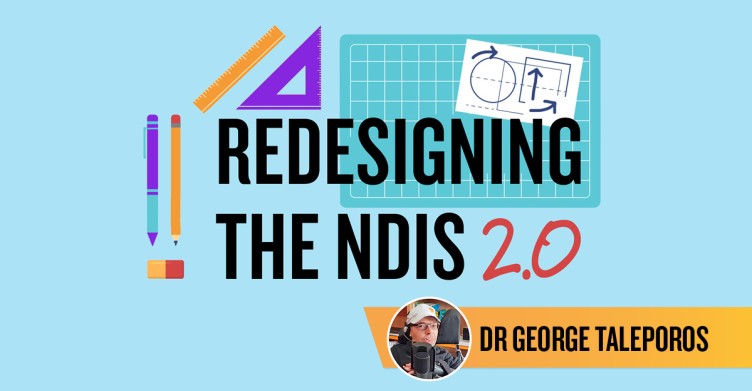My Take On “Redesigning the NDIS”

“Redesigning the NDIS” by Dr Simon Duffy, global expert on self-directed support, and NDIS participant and researcher Dr Mark Brown will stir debate within the Australian disability sector, by providing an uncomfortable perspective on the NDIS.
A dire warning
The report draws on historical events in the UK, where the funding for disability services came under attack and supports were dramatically cut, suddenly and viciously.
The authors believe that this could happen in Australia, if we don’t take control of the increasing cost of the NDIS. They call on the disability community to take responsibility for reducing the increasing costs because if we don’t, the public support could turn against us and destroy the NDIS altogether.
More services lead to more social exclusion
The authors believe that the NDIS encourages people to build our lives around services and this too often leads to social exclusion, as social connections are replaced by more and more services. The report encourages us to look at what makes a good life, and argues that rather than helping people have a good life, services often get in the way. Instead of driving us to consume services or, the NDIS should support people to learn new skills, build relationships, and be part of the community.
Speaking on my podcast Reasonable & Necessary Dr Duffy said:
“(the NDIS is) a system that will lead to more money being spent on services… but services themselves are … more likely to exclude you or at least certainly don’t do the work of including you. People’s agency does. Spending more money on services doesn’t tell you a lot about whether people are better included. The history of services is a history of exclusion.”
Inclusion is of course the ultimate goal and socio-economic participation is one of the key reasons for the NDIS, but the authors believe that in order to achieve inclusion, the NDIS needs a serious redesign.
Personal budgets and freedom to make decisions
At the heart of this redesign is a system of personal budgets that are self-directed, reliable and controlled by the NDIS participant. These personal budgets would provide total freedom for the person to use the funding without any restrictions. This encourages innovation, creativity, and thinking beyond the traditional disability service system and in doing so increases opportunities for social inclusion.
The authors say that budgets should be correlated to “broad descriptions of need and subject to reasonable human judgements, with accountability”. How these judgements will be made in an accountable way is not provided, instead the authors recommend a process of collective bargaining by people with disabilities with the government to work it out together.
Invest in peer support
Peer support is another key element of the redesign suggested by the authors, because people make better decisions for themselves when they can share ideas and learn from each other’s experiences.
During our interview, Dr Brown said:
“Peer support might be the answer to a number of problems and a number of fears people will have about the kind of things we’re suggesting. Who’s looking after you if the NDIA is not monitoring you closely? The answer might be if we have stronger peer networks. If you’ve got connections with other people with lived experience, that might be the basis of good planning, good monitoring, safeguards. Because you’ve got a community.”
My take…
These are not new ideas, in fact, personal budgets, tied with increased control over our budgets were initiated by the previous government as a solution to address sustainability. It is my view that the personal budget element would be a great reform. But it is how you get to that budget that becomes problematic if it’s not codesigned with the disability community. We defeated independent assessments because we did not want a system of “roboplanning” imposed on us, that was not codesigned and that did not recognise our individual needs, goals and circumstances.
Last week, the NDIS Review gave us a sneak peek of their upcoming recommendations, signalling that independent assessments might be back on the table. Professor Bruce Bonyhady foreshadowed replacing line by line decisions about individual supports with an overall budget level that would be provided prior to planning. And once again, a decision was felt thrust upon us without the codesign approach that we had been promised. Bruce has assured me that he won’t be recommending independent assessments 2.0, but the similarities are striking. We will explore this further in my next podcast with Bruce, coming up in September.
The Duffy and Brown report calls on the disability community to work collectively with government to establish a system of resource allocation that is sufficient, transparent, reliable and sustainable. It calls on the government to invest in peer support and to give people with disability complete control over our funding. It calls for a simpler and less bureaucratic NDIS, that enables us to make our own decisions, free ourselves from traditional service models to build relationships and valued lives in our chosen communities.
That’s exactly what I want from a new NDIS. And of course it needs to be sustainable. But that can only happen if the government brings us to the decision making table and invests in the deep codesign work that is needed. Without that, the rebuilding of trust between our community and the government will abruptly end, and that will be devastating for our community and for the government. I hope Bill Shorten is listening.

Join the conversation